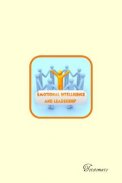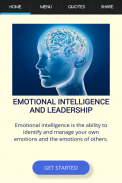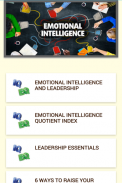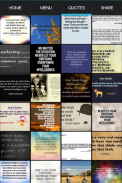






Emotional Intelligence And Leadership

Emotional Intelligence And Leadership介绍
What Is Emotional Intelligence?
Emotional intelligence is the ability to identify and manage your own emotions and the emotions of others. It is generally said to include three skills: emotional awareness; the ability to harness emotions and apply them to tasks like thinking and problem solving; and the ability to manage emotions, which includes regulating your own emotions and cheering up or
But we can actually sum up it up in a single, simple sentence: Emotional intelligence is the ability to make emotions work for you, instead of against you.
According to emotional intelligence, or EQ, success is strongly influenced by personal qualities such as perseverance, self-control and skill in getting along with others.
Emotional Intelligence or “EQ” according to J. Mayer and P. Salovey in their book Emotional Development and Emotional Intelligence is the ability to perceive emotions, to access and generate emotions so as to assist thought, and to reflectively regulate it
Simply put, EQ is the ability to understand one’s own emotions as well as the emotions of others and determines how you react appropriately to them. This includes a person’s ability to handle conflicts, negotiate, and communicate.
In his best-selling book, Emotional Intelligence: Why it can matter more than IQ2, psychologist Daniel Goleman points out that a higher IQ doesn’t automatically guarantee a person’s success. EQ is what determines a person’s chances of moving up the ladder in a workplace where IQ and technical knowledge are pretty much the same.
A person’s ability to relate well with others, manage misunderstandings, lead with empathy, handle negotiations, and solve problems collaboratively determine his success in school and in the workplace.
Emotional intelligence is, in layman’s terms, our level of ability to:
• Recognize and understand our emotions and reactions (self-awareness)
• Manage, control, and adapt our emotions, mood, reactions, and responses (self-management)
• Harness our emotions to motivate ourselves to take appropriate action, commit, follow-through, and work toward the achievement of our goals (motivation)
• Discern the feelings of others, understand their emotions, and utilize that understanding to relate to others more effectively (empathy)
• Build relationships, relate to others in social situations, lead, negotiate conflict, and work as part of a team (social skills)
Download Emotional Intelligence and leadership app for FREE now!
DISCLAIMER :
Content like Articles, Pictures and Video in this application were collected from all over the web, so if I have violated your copyright, please let me know and it will be removed as soon as possible.
All copyrights and trademarks are owned by their respective owners. This app is not endorsed by or affiliated with any other affiliated entities.
什么是情商?
情商是识别和管理自己的情绪和他人情绪的能力。人们普遍认为包括三个技能:情感意识;驾驭情绪,并将其应用到喜欢思考和解决问题的任务的能力;以及管理情绪的能力,其中包括调节自己的情绪,振作起来或
但是,我们其实可以在一个单一的,简单的一句话来概括起来:情商是让情绪为你工作,而不是对你的能力。
据情商,EQ或者,成功的强烈的个人素质,如毅力,自我控制和与人相处的技能的影响。
根据J. Mayer和P.沙洛维在他们的书中情绪发展和情商情商或“EQ”是感知情感,访问和产生的情绪,以便协助思想,并反射性调节它的能力
简单地说,情商是要了解自己的情绪以及他人情绪的能力,并确定如何恰当地应对它们。这包括一个人处理冲突,协商和沟通能力。
在他的畅销书,情商:为什么它能够决定的事情比IQ2多,心理学家丹尼尔·戈尔曼指出,更高的智商并不能自动保证一个人的成功。 EQ是什么决定一个人在工作场所升职的机会,其中智商和技术知识是几乎一样的。
一个人与其他人有关好,管理的误解,有同情引起,处理谈判,解决问题的协作决定了他在学校和职场成功的能力。
情商是,通俗地说,我们的能力水平:
•认识并理解我们的情绪和反应(自我意识)
•管理,控制和调整我们的情绪,心情,反应和响应(自我管理)
•利用我们的情绪,激励自己,采取适当的行动,承诺,坚持到底,并朝着实现我们的目标(动机)工作
•辨清别人的感受,了解他们的情绪,并利用这种理解与别人交往更有效(同情)
•建立关系,与他人在社交场合,铅,洽谈冲突和工作作为一个团队的一部分(社交技巧)
下载情商和领导力的应用程序现在免费注册!
免责声明:
像文章,图片和视频在这个应用程序的内容是从所有网站上收集的,所以如果我侵犯了您的版权,请让我知道,它会被尽快删除。
所有版权和商标均为其各自所有者拥有。这个程序不认可或与任何其他下属实体关联。
























